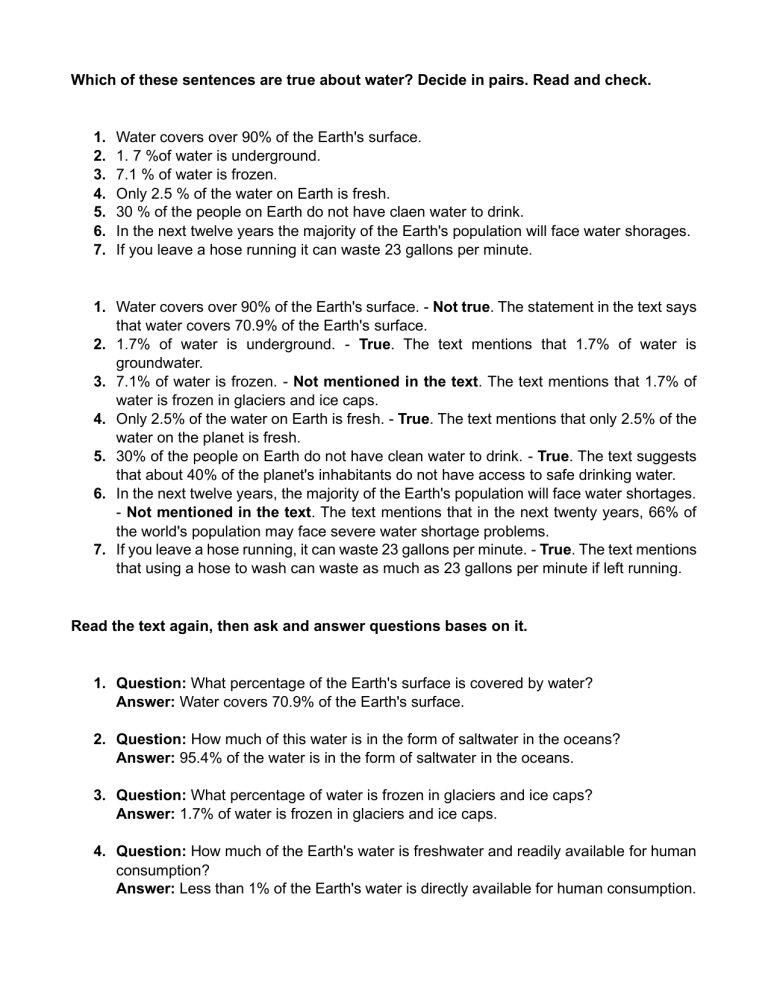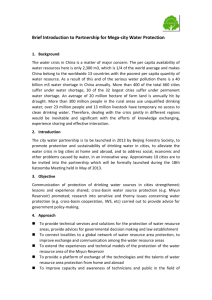Water Facts Worksheet: Earth's Water, Usage, Conservation
advertisement

Which of these sentences are true about water? Decide in pairs. Read and check. 1. 2. 3. 4. 5. 6. 7. Water covers over 90% of the Earth's surface. 1. 7 %of water is underground. 7.1 % of water is frozen. Only 2.5 % of the water on Earth is fresh. 30 % of the people on Earth do not have claen water to drink. In the next twelve years the majority of the Earth's population will face water shorages. If you leave a hose running it can waste 23 gallons per minute. 1. Water covers over 90% of the Earth's surface. - Not true. The statement in the text says that water covers 70.9% of the Earth's surface. 2. 1.7% of water is underground. - True. The text mentions that 1.7% of water is groundwater. 3. 7.1% of water is frozen. - Not mentioned in the text. The text mentions that 1.7% of water is frozen in glaciers and ice caps. 4. Only 2.5% of the water on Earth is fresh. - True. The text mentions that only 2.5% of the water on the planet is fresh. 5. 30% of the people on Earth do not have clean water to drink. - True. The text suggests that about 40% of the planet's inhabitants do not have access to safe drinking water. 6. In the next twelve years, the majority of the Earth's population will face water shortages. - Not mentioned in the text. The text mentions that in the next twenty years, 66% of the world's population may face severe water shortage problems. 7. If you leave a hose running, it can waste 23 gallons per minute. - True. The text mentions that using a hose to wash can waste as much as 23 gallons per minute if left running. Read the text again, then ask and answer questions bases on it. 1. Question: What percentage of the Earth's surface is covered by water? Answer: Water covers 70.9% of the Earth's surface. 2. Question: How much of this water is in the form of saltwater in the oceans? Answer: 95.4% of the water is in the form of saltwater in the oceans. 3. Question: What percentage of water is frozen in glaciers and ice caps? Answer: 1.7% of water is frozen in glaciers and ice caps. 4. Question: How much of the Earth's water is freshwater and readily available for human consumption? Answer: Less than 1% of the Earth's water is directly available for human consumption. 5. Question: What percentage of the global population does not have access to safe drinking water? Answer: About 40% of the planet's inhabitants do not have access to safe drinking water. 6. Question: What percentage of the world's population is estimated to face severe water shortage problems in the next twenty years? Answer: It is estimated that in the next twenty years, 66% of the world's population may face severe water shortage problems. 7. Question: How much water can be wasted per minute if a hose is left running? Answer: Using a hose can waste as much as 23 gallons per minute if left running. In groups collect information about water. Use the internet or other sources. Prepare a quiz for your classmates. 1. Question: What percentage of the Earth's surface is covered by water? Answer: Water covers 70.9% of the Earth's surface. 2. Question: How much of the global population may face severe water shortage problems in the next twenty years, according to the text? Answer: It is estimated that in the next twenty years, 66% of the world's population may face severe water shortage problems. 3. Question: What is the recommended time for watering your plants and garden to minimize water wastage, as mentioned in the text? Answer: The ideal time to water your plants and garden is either in the early morning or late evening, as watering when it's hot can lead to water evaporating before the plants can absorb it. What would you life be without water? Write sentences. Tell the class. Life without water would be unimaginable. It's essential for our survival, and it plays a vital role in our daily lives. Without water, we wouldn't have access to safe drinking water, agriculture would suffer, and many industrial processes would come to a halt. Water is not only necessary for our physical well-being but also for the functioning of our societies and economies. It is a precious resource that we must use wisely and protect for future generations. Are there enviromental groups / organizsations in your country or in another European country? What aspects of enviromentalism do they deal with? As for environmental groups/organizations in my country or other European countries, yes, there are numerous environmental organizations across the world, including in Europe. They deal with a wide range of environmental issues, such as climate change, wildlife conservation, air and water quality, sustainable energy, and more. These organizations work to raise awareness, advocate for policies, and take direct action to address environmental challenges. The specific aspects of environmentalism they focus on may vary from organization to organization and from country to country.


